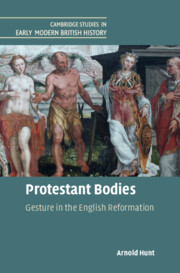Book contents
- Protestant Bodies
- Cambridge Studies in Early Modern British History
- Protestant Bodies
- Copyright page
- Epigraph
- Contents
- Illustrations
- Preface and Acknowledgements
- Abbreviations
- Introduction
- Chapter 1 Passion and Persuasion
- Chapter 2 Repentance
- Chapter 3 Subjection
- Chapter 4 Blessing and Protection
- Chapter 5 Deference and Civility
- Chapter 6 Reverence
- Conclusion
- Bibliography
- Index
Conclusion
A Death of Gestures?
Published online by Cambridge University Press: 20 February 2025
- Protestant Bodies
- Cambridge Studies in Early Modern British History
- Protestant Bodies
- Copyright page
- Epigraph
- Contents
- Illustrations
- Preface and Acknowledgements
- Abbreviations
- Introduction
- Chapter 1 Passion and Persuasion
- Chapter 2 Repentance
- Chapter 3 Subjection
- Chapter 4 Blessing and Protection
- Chapter 5 Deference and Civility
- Chapter 6 Reverence
- Conclusion
- Bibliography
- Index
Summary
The conclusion traces a history of religious gesture from the mid-seventeenth century to the present day. This period saw major changes in gesture and bodily habitus which we could characterise in three ways. First, there is the decline of uniformity, that is, the gradual abandonment of attempts to enforce bodily uniformity as a means of social discipline, whether in religious worship or in other forms of collective social activity. Secondly, there is the process that sociologists have labelled the decline of deference, whereby individuals in the modern West are, for the most part, no longer required to kneel or bow to social superiors, or to use gestures of reverence in sacred spaces. Lastly, there is the decline of formality, a growing discomfort with formal ritual which could also be described in terms of interiority or individualism, as a belief that the mind rather than the body is the true locus of selfhood. In all these respects it would be rather easy to see the world of early modern religion described in this book as a world we have lost. But I want to argue that this model is unsatisfactory, or at least incomplete.
- Type
- Chapter
- Information
- Protestant BodiesGesture in the English Reformation, pp. 287 - 316Publisher: Cambridge University PressPrint publication year: 2025

